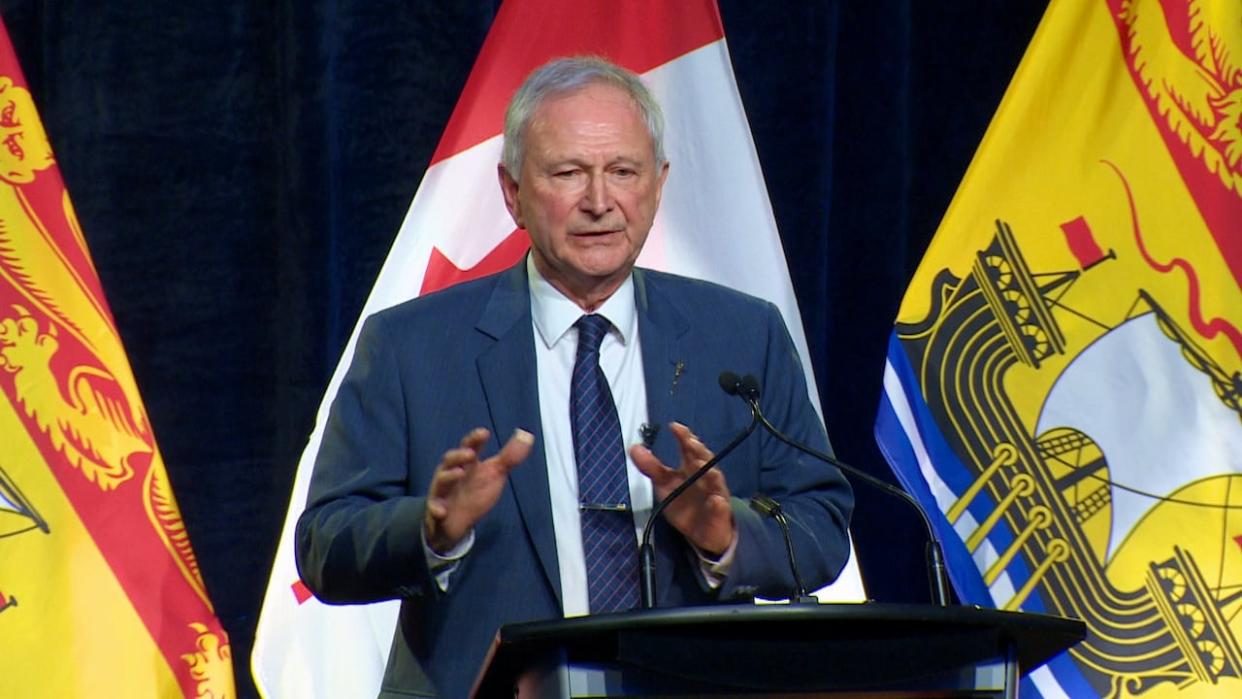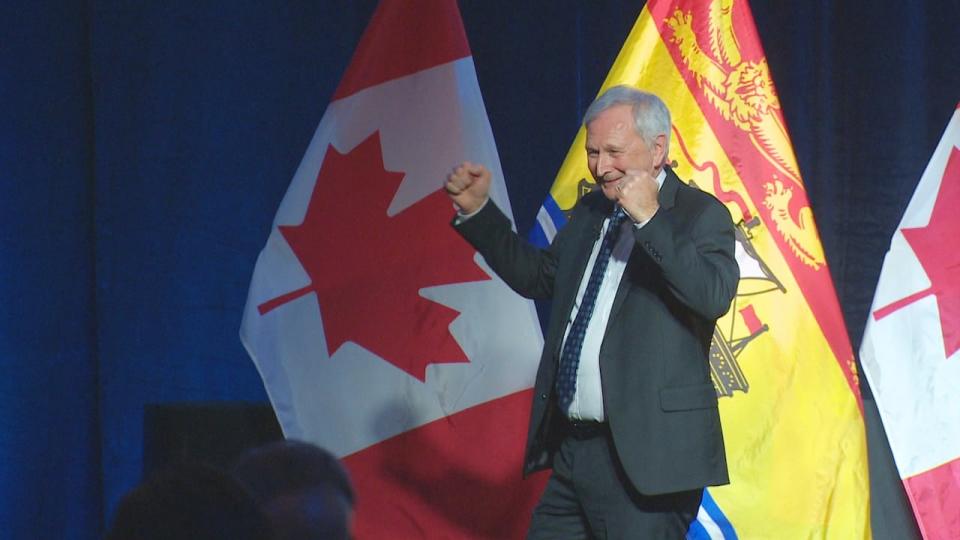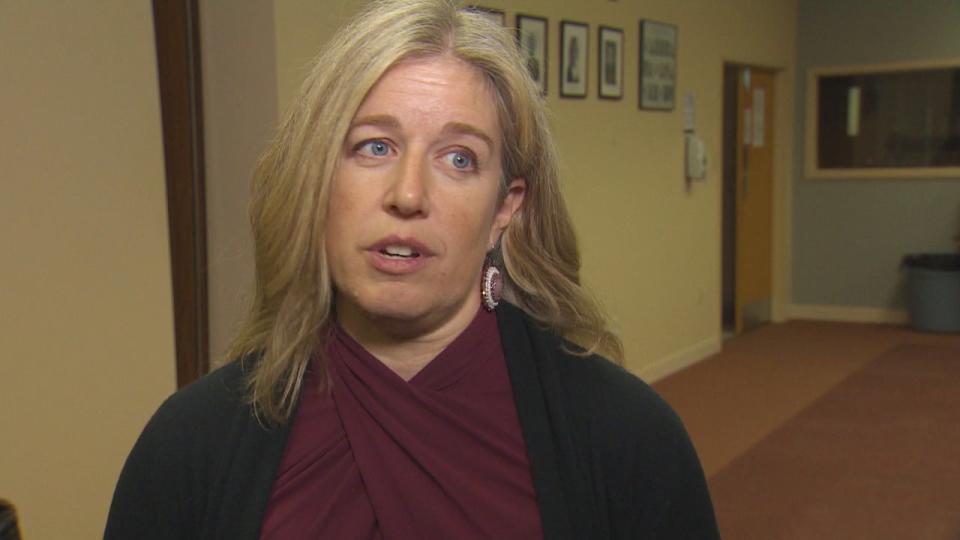Higgs talks health, affordability in pre-election state of the province speech

- Oops!Something went wrong.Please try again later.
Premier Blaine Higgs returned to pocketbook issues Thursday in his final state of the province speech before this year's election, making new promises on health care, addiction services and the cost of living while mostly avoiding the Policy 713 controversy.
Higgs announced his government will dip into its budget surplus again to offer a new round of one-time payments for low–income families.
He also said that, on top of reforms already underway, a new MyHealthNB app will put more information in the hands of patients, from test results and vaccination records to emergency department wait times and diagnostic imaging.
And he promised a doubling of capacity for addiction treatment for adults, arguing addiction is one of the root causes of the growing housing and homelessness crisis in the province.

In last year's speech, Higgs focused on core policy issues and the province’s strong economic performance, record-breaking population growth and balanced budgets before dancing off stage to Should I Stay or Should I Go? by the Clash. (Ed Hunter/CBC)
The speech, to a crowd of about 850 businesspeople, community leaders and others, made only passing reference to "parents' rights," Higgs's way of describing his changes to Policy 713 on sexual orientation and gender identity in provincial schools.
The annual event is a showcase for premiers, who treat it as a chance to speak directly to New Brunswickers via a local cable-access broadcast of the speech.
HIggs tried to rebut critics who say he's unwilling to spend tax dollars to address pressing needs, pointing out that the construction budget for new schools has increased by 64 per cent since 2021 as enrolments have swelled.
"For anyone who thinks we are not spending money, I beg to differ," he said.
Higgs said he hopes one-time payments of $300 to families with a net income of $70,000 or less — more than 250,000 families, he said — will start going out next month.
It's the second such announcement in three months.

One of the several dozen members of the Canadian Union of Public Employees who protested outside the speech venue Thursday night. (Jacques Poitras/CBC)
In November, the province said low-income seniors who already receive a $400 benefit would get an additional $200, an increase that will be made permanent in this year's budget.
And people on social assistance and youth who receive a benefit because they can't live at home will receive an additional $200 per month starting in February.
The new payment will cost $79.5 million, an expense Higgs said was made possible by budget surpluses that have lowered interest payments on the province's accumulated debt.
The emphasis on health care, affordability and housing harkened back to the premier's 2023 state of the province speech, when he focused on core policy issues and the province's strong economic performance, record-breaking population growth and balanced budgets.
Policy 713 not big topic in Thursday speech
In the intervening 12 months, Higgs waded into a major controversy with his changes to Policy 713, which now requires school staff to get the consent of parents before letting LGBTQ students under age 16 use the names and pronouns they choose in classrooms.
It's been a centrepiece of his recent fundraising for the PC Party, but he avoided talking about it at length Thursday night.
He spoke of the importance of family connections while telling an anecdote about one of his daughters, and briefly mentioned "parents' rights" among several "tough issues" he said his government was tackling.

Liberal Leader Susan Holt said this year’s speech glossed over the difficulties facing the province. (Ed Hunter/CBC)
He also acknowledged having had "differences" within his Progressive Conservative caucus without specifying why.
The Policy 713 issue provoked a split in that caucus last June and the departure of four cabinet ministers from his government, two through resignations and two in a cabinet shuffle.
At least three of those former ministers, Dorothy Shephard, Trevor Holder and Jeff Carr, attended Thursday's speech.
Higgs told reporters he didn't discuss Policy 713 at length because "we've been clear on our position. That hasn't changed."
Another such tough issue, Higgs told the large crowd, was the recent legislation his government passed to force five public-sector employee groups into a shared-risk pension system.
Protest over shared-risk pension system
Several dozen members of the Canadian Union of Public Employees protested outside the speech venue Thursday night.
"We're letting the premier and his Conservative caucus know that we're far from done," said CUPE New Brunswick president Stephen Drost, adding a legal challenge to the legislation was coming "in the very near future."
The premier said the rising number of homeless people in cities and towns is tied in part to addiction and said the government will double the capacity of adult addiction treatment with a new four-to-six-month treatment program starting with 50 beds.
He said more details will be announced in the spring.
"Our goal is to help individuals re-establish ties with their families and provide social integration, skills and tools to help them cope with everyday life," he said.
Higgs argued that many of the challenges come from a positive development — the province's record population growth.
"While it can be exciting to see so much development and interest in our province, it's also been difficult managing that growth with the impact it is having on housing, health care, and schools," he said.
"We are investing more than ever, but the reality is that our growth has come very quickly, and we are introducing major shifts that take time."
The Opposition Liberals said this year's speech glossed over the difficulties facing the province.
"The premier is painting a rosy picture of New Brunswick when New Brunswickers aren't smelling the roses," said leader Susan Holt.
"New Brunswickers are struggling, and they want better health care, and better education, and we have a premier talking about an app instead of real solutions to the challenges we're facing."
Earlier this week, the Liberals released a "report card" on Higgs's performance that was based on a survey of Liberal Party members as well as input from community groups and stakeholders.
The non-scientific performance scores ranged from 31 per cent for the PC record on the cost of living and education to 22 per cent on housing.
Green Party Leader David Coon left the speech without speaking to reporters.
The next election is scheduled for Oct. 21, though Higgs has not ruled out calling it earlier.

